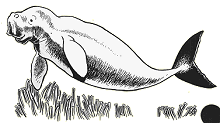| Dugongs
are the world's only fully vegetarian
marine mammal and the only sea
cow in Australian seas. Dugongs,
like whales and dolphins spend
their lives at sea.
Australian
dugongs range from Shark Bay
in Western Australia around
the north to Moreton Bay in
Queensland. It is believed there
are 80,000 dugongs in Australian
waters, approximately 14,000
of them on the Great Barrier
Reef.
Dugongs
are a fish-like shape, with
flippers and a tail and can
grow up to three metres long
and weigh up to 400 kilograms.
Their skin is thick and smooth.
|

Drawing
courtesy Wet
Paper |
Their
nostrils are located near the front
of their head enabling them to breath
with most of their body beneath the
surface. Unlike other mammals, dugongs
cannot hold their breath under water
for very long. Their mouths are large,
and the upper lip is covered in bristles
which are used to find and grasp seagrass.
Dugongs' ears and eyes are found on
the side of the head, and their movements
are slow and graceful.
Dugongs live for approximately 70
years. Female dugongs first breed
between the ages of six and seventeen
years old. They produce calves every
two and a half to five years. Breeding
commences when the female is in oestrous
(on heat). Groups of male dugongs
will follow the female around and
will mate only with her. The female
will produce a single calf after a
14-month pregnancy. Most calves are
born between September and October,
and remain with their mother for around
18 months.
Dugongs along the Great Barrier Reef
feed mostly on small, delicate seagrasses,
which are low in fibre, high in nitrogen
and easily digestible. A dugong can
dig up an entire seagrass plant including
the roots. Dugongs do not have a chambered
stomach, but rely on an extremely
long intestine and bacteria living
within it to digest the cellulose
of seagrass.
Dugongs are considered 'threatened'
and are protected in the waters of
the Great Barrier Reef Marine Park.
Dugongs
have played an important part in traditions
and cultures of Aboriginal and Torres
Strait Islander people for thousands
of years, and are still hunted under
controlled conditions today.
The
greatest threat to dugongs is the
loss of their habitat. As a result
of increased siltation and nutrients
from human activities on the land,
such as dumping of dredge wastes,
urbanisation, industry and agriculture,
seagrass beds are diminishing. Nets
are also a threat to dugongs who can
become entangled and drown in certain
types of fishing nets. In some locations
fishing nets are restricted in order
to establish dugong protection areas.
Shark nets erected to protect beaches
have also been responsible for drowning
dugongs in Queensland. Many of these
nets have been replaced with drum
lines.
|
|
